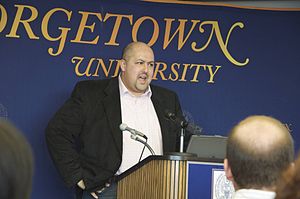- Siva Vaidhyanathan
-
Siva Vaidhyanathan (born 1966) is a cultural historian and media scholar, and is currently a professor of Media Studies and Law at the University of Virginia. Vaidhyanathan is a frequent contributor on media and cultural issues in various periodicals including The Chronicle of Higher Education, New York Times Magazine, The Nation, MSNBC.com, and Salon.com. He is a fellow of the New York Institute for the Humanities and the Institute for the Future of the Book.[citation needed] From 2004 through 2008 he maintained a blog, Sivacracy.net,[1] on which he frequently commented on media and technology issues, as well as his love of sports.[2]
Contents
Biography
Vaidhyanathan was born in Buffalo, New York, and attended the University of Texas at Austin, earning both a BA in History and a Ph.D. in American Studies. From 1999 through the summer of 2007 he worked in the Department of Culture and Communication at New York University, the School of Library and Information Studies at the University of Wisconsin–Madison and Columbia University.
Critical Information Studies
Critical Information Studies is a term coined by Siva Vaidhyanathan in 2006 to describe an emerging, transdisciplinary field concerned broadly with the politics of information in contemporary, connected societies. It first appeared in print in an essay he authored entitled, "Critical Information Studies: A Bibliographic Manifesto," which was the afterword to a 2006 special issue of the journal Cultural Studies.
Vaidhyanathan has argued that academics from many fields associated with what he calls “Critical Information Studies” (which synthesizes, yet also goes beyond, key aspects of both Cultural Studies and Political Economy) should be engaged in interrogating the “structures, functions, habits, norms, and practices” of particular aspects of information culture and in analyzing how these issues go beyond simple arguments about digital “rights” to include consideration of the more subtle impacts of cost and access that have the potential for chilling effects on a “semiotic democracy” that is situated in “global flows of information.”
Many of those affiliated with the field have been critical voices in professional organizations such as the Society for Social Studies of Science and the American Library Association who are concerned about how computer architecture may limit the possibilities of what Henry Jenkins has called "participatory culture." Rather than accept utopian enthusiasms about "Web 2.0" uncritically, these scholars point to possible vulnerabilities in democratic institutions posed by Digital Rights Management, tampering with electronic voting, and otherwise trusting private corporations with public information infrastructure.
According to Vaidhyanathan, Critical Information Studies is defined by four principal concerns:
- the abilities and liberties to use, revise, criticize, and manipulate cultural texts, images, ideas, and information;
- the rights and abilities of users (or consumers or citizens) to alter the means and techniques through which cultural texts and information are rendered, displayed, and distributed;
- the relationship among information control, property rights, technologies, and social norms; and
- the cultural, political, social, and economic ramifications of global flows of culture and information.
Vaidhyanathan goes on to argue that Critical Information Studies is "inchoate." Rather than an established field in its own right, it is one that is beginning to take shape and gain its own sense of identity. His essay therefore provides a detailed "taxonomy" of work which, though coming from disparate disciplines, could justifiably be included under this new rubric. These disciplines include American Studies, Anthropology, Communication, Computer Science, Cultural Studies, Ethnic Studies, Legal Studies, Library and Information Science, Literary Studies, Media Studies, Musicology, Political Science, and Sociology. Because work in Critical Information Studies cuts across these and other more traditional academic domains, Vaidhyanathan describes it as a "transfield."
Although Vaidhyanathan identifies Critical Information Studies as a scholarly practice, he also stresses its strong commitment to public engagement.
Selected books
- Copyrights and Copywrongs: The Rise of Intellectual Property and How It Threatens Creativity, NYU Press, 2001. (ISBN 978-0814788073)
- The Anarchist in the Library: How the Clash Between Freedom and Control Is Hacking the Real World and Crashing the System, Basic Books, 2004. (ISBN 978-0465089857)
- Rewiring the Nation: The Place of Technology in American Studies, co-edited with Carolyn de la Peña, Johns Hopkins University Press, 2007. (ISBN 978-0801886515)
- The Googlization of Everything -- and Why We Should Worry, University of California Press, 2011. (ISBN 978-0520258822). The text was in open development on a blog, launched September 27, 2007 in collaboration with the Institute for the Future of the Book.
See also
- Anti-copyright
- Good Copy Bad Copy
- Mashup (music)
- Steal This Film
- Googlization
References
- Camp, L. Jean. DRM: doesn't really mean digital copyright management
- Eschenfelder, Kristin R. (2007) Every Library’s Nightmare? Digital Rights Management and Licensed Scholarly Digital Resources
- Ross, Andrew. "Technology and Below-the-Line Labor in the Copyfight over Intellectual Property". American Quarterly, Volume 58, Number 3, September 2006, pp. 743–766
- Vaidhyanathan, Siva. "Critical Information Studies: A Bibliographic Manifesto". Cultural Studies 20(2/3) (March/May 2006): 292–315. ISSN 0950-2386 Download the .pdf
External links
Categories:- 1966 births
- American academics
- Copyright activists
- Copyright scholars
- Intellectual property activism
- Living people
- American bloggers
- University of Virginia School of Law faculty
Wikimedia Foundation. 2010.

